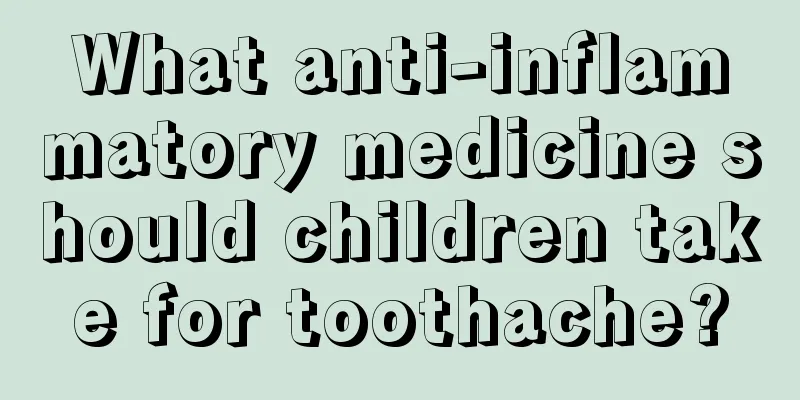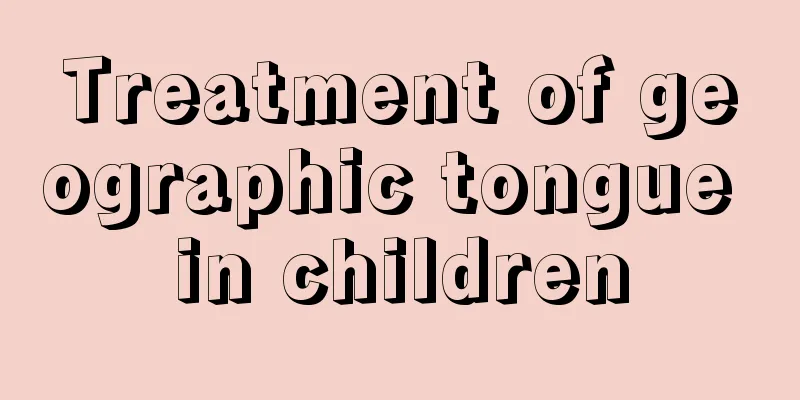What anti-inflammatory medicine should children take for toothache?

|
Sweets are the favorite of many children. Since modern parents are very indulgent to their children, they often pile up a lot of candies, biscuits or cakes at home for their children to eat as much as they want. However, eating too much sweets can seriously damage children's teeth, especially if they do not pay attention to oral hygiene, children are prone to toothache. So, what anti-inflammatory medicine should children take when they have toothache? What anti-inflammatory medicine should children take for toothache When children have toothache, they are usually given oral ibuprofen sustained-release capsules, amoxicillin and clavulanate potassium for anti-inflammatory and analgesic treatment. If pain occurs at night, they need to go to the hospital's dental department for treatment. Dental treatment of toothache is a thorough treatment method. Children need to have their oral cavity examined every six months and an oral health record should be established. How to prevent toothache 1. Brush your teeth correctly This is an effective way to remove dental plaque. First, buy a children's health toothbrush for your child with a small brush head, soft bristles, and rounded and elastic bristle ends. Then buy a monofluoride toothpaste containing sodium fluoride or a bifluoride toothpaste containing sodium monofluorophosphate. Fluoride in toothpaste can strengthen tooth surface structure, promote mineralization, improve acid resistance and inhibit dental plaque. The dosage for children is about the size of a pea. The dosage can be increased appropriately as the child grows older. Avoid swallowing it when brushing your teeth. When children first learn to brush their teeth, parents should demonstrate and patiently teach them how to brush their teeth correctly. The key to brushing your teeth correctly is to keep the bristles at about 45 degrees to the tooth surface and brush vertically along the gaps between teeth. Brush downward for the upper teeth, upward for the lower teeth, and back and forth in front of the bite. Instead of brushing horizontally in a sawing motion, which can damage teeth and gums. Brush your teeth for 3 minutes each time, once in the morning and once in the evening, and persist. 2. Eat a healthy diet Sweets are children's favorite foods, which contain a lot of sugar and starch. For example, candy, chocolate, biscuits and cakes. In particular, sticky sweets are easy to adhere to the tooth surface, providing sufficient nutrients for cariogenic bacteria in dental plaque. The organic acids produced after metabolism are highly cariogenic. Therefore, children should be advised to eat less sweets, especially not before going to bed, and should brush their teeth after eating before going to bed. In addition, do not be picky about food in your daily diet. The dietary ingredients should include whole grains, beans and bean products, milk and dairy products, fish, meat, eggs, poultry, and vegetables and fruits. This is beneficial to the child's growth, development and physical health. 3. Regular inspection Since tooth decay has no symptoms in the early stages and is difficult to detect, parents are often quick to take their children to the hospital only when pain symptoms occur, but by then the best time for treatment has often been missed. Therefore, doctors recommend that the first check-up should be conducted when the child is one year old, and regular check-ups should be conducted every six months thereafter to ensure that caries are treated promptly if discovered. Don't neglect your child's dental health due to busy work. May your child have clean and healthy teeth. 4. Clean your teeth regularly According to clinical statistics, more than 90% of the Chinese population suffer from gingivitis to varying degrees, but by the time people discover it, it has often developed into periodontitis. At this time, the doctor can control the further development of inflammation, but the damaged periodontal tissue is difficult to completely recover. Therefore, teeth cleaning is also called pre-periodontal treatment. Doctors recommend that dental cleaning 1 to 2 times a year can effectively prevent gingivitis and periodontitis. |
<<: Can a three-year-old child drink milk regularly?
>>: Tips for cleaning earwax for two-year-old babies
Recommend
Is baby diarrhea contagious?
Under normal circumstances, baby diarrhea is gene...
What soup is good for children to supplement calcium?
It is very necessary for children to supplement c...
What to do if your baby coughs after falling asleep
It is inevitable for babies to catch a cold. Usua...
What to bathe a baby with jaundice
Newborn jaundice is the most common symptom, but ...
What to do if your child has cough and asthma
Once a child has asthma problems, it can be very ...
Early symptoms of convulsions in children
Unlike adults, children's organs are not full...
Why does my child keep rubbing his eyes?
If you find that your child is always rubbing his...
Early symptoms of foot-mouth and hand disease in children
Hand, foot and mouth disease is a very common dis...
Teach children or destroy children. Do you really understand the world of boys?
Nowadays, more and more young couples think that ...
What to do if a child has a fish bone stuck in his throat?
In this hot summer, many friends like to go to th...
Tips for removing baby's earwax, parents should pay attention
Earwax is a kind of secretion from the ear canal....
Children's age and height standard indicators
I don’t know if you are aware of the age and heig...
What are the symptoms of encephalitis in children?
The harm of encephalitis in children is relativel...
What should I do if my baby walks unsteadily after having a fever?
Babies are very susceptible to viral infections, ...
Nine kinds of lutein drinks can keep children from the risk of myopia
Numerous studies have shown that if a person is n...









